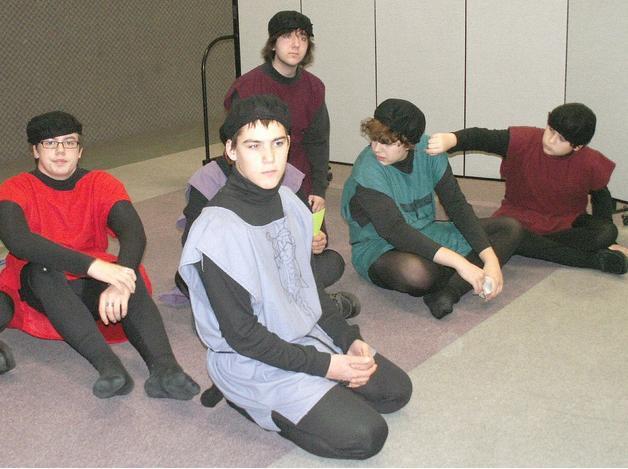
German Fine Arts: Drama

Figure 1.-- Here we see modern German teenagers involved in drama. We suspect that they are costumed for an unknown play set in the he 12th century. This may be a school play, although we are not posditive. We don't know much about school plays in Germany, but we know
that Shakespeare has always been popular in Germany and theatre productions are considered part of the student learning experience.
Since there are no girls here, I wonder if these plays were for boys only. We have no idea of the dates of these photos or the precise
location. Since they are good quality color photos, we think they may very well be quite recent.
|
|
The German dramatic tradition is somewhat different than the rest of Europe in that Germany thanks to the Battle of the Teutoburg Forest did not become part of the Roman Empire. The Empire stopped at the Rhine. Thus the Germans were not exposed to classical drama and there are no Roman theaters in Germany. As the classical tradition was virtally lost in the West, this may not have been as big a factor as might have been thought. The history of German drama dates to a generalized European medieval era and the entertaiments of markets. Often they were quite baudy. Another influence was the liturgical tradition of the church bits of chanted dialogue, known as tropes, were used with the liturgy. Priests playing biblical figures, acted out scenes from the holiday stories. These short plays eventually became more elaborate and began to be staged outside the churches. We now know them as passion plays. Secular often baudy elements were introduced as guilds began to replace the priests. The glorification of God became mixed with the celebration of local toen's aschievements. This tradition continues weith the Oberammergau Passionsspledarsteller. The nature of the plays and roles was strongly influenced by the guild master-singers of Nuremberg and other important market towns. At about this time, as a result of the renaissance, clasical plays become increasingly known to scholars. German dramicists emerged. Luther was suspious of drama. And German dramicists were eclipsed by French and English authors by Moliere and Shakespeare. German dramna came into its own with Gothe and "Faustus" (19th century). We know very little about school theatricals in Germany. A factor here may also be the more limited approach to extra-curricular activities in German schools. We note some unidentified boys putting on a play during World War I, but we are not sure it is a school group. One author describes Berlin today as one of the culturally most vibrant cities in Europe. Berlin has more than a hundred theaters as well as and several opera houses. Theatrical performances are very divers. Theater goers can chose from performnces of classical drama, vaudeville, Broadway musicals, and opera.
HBC

Navigate the Boys' Historical Clothing Web Site:
[Return to the Main German fine arts page]
[Return to the Main German activities page]
[Introduction]
[Biographies]
[Chronology]
[Clothing styles]
[Countries]
[Photography]
[Bibliographies]
[Contributions]
[FAQs]
[German glossaries]
[Images]
[Links]
[Registration]
[Tools]
[Boys' Clothing Home]
Created: 5:19 AM 12/10/2010
Last updated: 5:19 AM 12/10/2010



